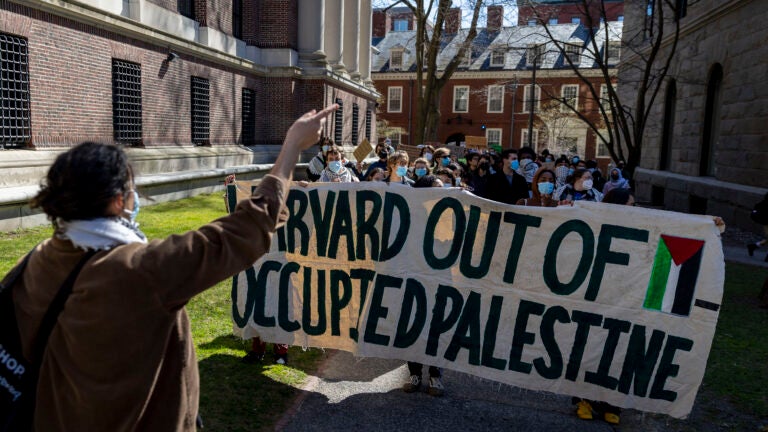Sign up for the Today newsletter
Get everything you need to know to start your day, delivered right to your inbox every morning.

A Harvard pro-Palestinian student group was placed on probation Wednesday for “violating policies pertaining to undergraduate student organizations and to university campus use,” after the announcement Monday of a federal review threatening roughly $9 billion in funding cuts to the university.
The Harvard Undergraduate Palestinian Solidarity Committee’s probation extends through June 30, and prohibits the organization from accessing campus resources, a Harvard College spokesperson told Boston.com.
The student group, which has previously been placed on probation for similar violations, has the opportunity to file an appeal.
“There is a difference to how Harvard rules are applied, and it has a name: the Palestine exception,” the HUPSC said in a post on Instagram. “Is this Harvard’s definition of intellectual vitality?”
The HUPSC did not immediately respond to a request for further comment.
The sanction comes after federal agencies announced a comprehensive review of federal contracts and grants at Harvard University and its affiliates on Monday.
The review is part of the “ongoing efforts” of the Joint Task Force to Combat Anti-Semitism which aims to “ensure the university is in compliance with federal regulations, including its civil rights responsibilities,” according to a statement from federal authorities.
The task force will review more than $255.6 million in contracts between Harvard University, its affiliates, and the federal government, the statement said. It also includes more than $8.7 billion in multi-year grant commitments to Harvard University and its affiliates.
“If this funding is stopped, it will halt life-saving research and imperil important scientific research and innovation,” Harvard University President Alan Garber said of the review. “We will engage with members of the federal government’s task force to combat antisemitism to ensure that they have a full account of the work we have done and the actions we will take going forward to combat antisemitism.”
Wednesday’s sanctions were imposed following a rally with participants from the HUPSC on April 1, during which sound was amplified and movement in and around campus buildings was blocked, violating Harvard University Campus Rules, university officials said in a statement.
“It’s high time for [the HUPSC] to be permanently banned as a recognized and supported entity on campus,” Rabbi Hirschy Zarchi, founder and president of Harvard Chabad, told Boston.com.
A crowd of over 200 protesters rallied on Harvard University’s campus on Tuesday to oppose the potential federal funding cuts and the Trump administration’s crackdown on immigration, The Boston Globe reported, as some protesters carried pro-Palestinian signs.
“Harvard faculty and staff who incite and cheer on students in their unlawful violations and disruptions should be held accountable to a higher standard,” Zarchi said of Tuesday’s rally. “We call on the administration to act swiftly and urgently to discipline the individuals who continue to cause great harm to the university’s ability to carry out its critical mission.”
The HUPSC also co-sponsored the event with unrecognized student organizations which the Harvard College Student Organization Resource Guide prohibits, according to Harvard’s statement about the sanction.
“Our commitment to creating a campus environment where free expression thrives requires that members of our community adhere to Harvard’s policies and rules, including those relating to time, place, and manner restrictions,” the Harvard College spokesperson said.
Following the sanction’s announcement, the HUPSC urged Harvard student organizations to sign on to a letter addressed to President Garber.
“As Trump’s fascist policies accelerate surveillance and violence across the United States, it is Harvard’s responsibility, as the most powerful academic institution in the world, to stand up for its own community and for all higher education,” the letter, which is keeping the names of organizations signed onto it private, says. “Instead, administrators have chosen to sacrifice us in the hope of saving themselves.”
Threats to Harvard University’s funding come after Columbia University succumbed to similar pressure from the Trump administration, agreeing to make changes to its Middle East studies department and amend its rules for protests and student disciplinary measures.
Christopher Rufo, the so-called “mastermind” behind former Harvard University president Claudine Gay’s ousting, urged the Trump administration to “leverage its successful approach” at Columbia University by using similar tactics at other higher education institutions.
“Though elite universities are among the nation’s wealthiest institutions, they are vulnerable to financial pressure and fold easily,” Rufo wrote.
Nevertheless, hundreds of Harvard professors called on university leaders to push back against the federal government in what they see as an attack on higher education.
“Authoritarianism gains oxygen and strength from silence and fear,” Khalil Gibran Muhammad, a visiting scholar at Harvard, told The Boston Globe. “There’s no stopping this train, unless people choose to resist, choose to litigate, choose to fight.”

Lindsay Shachnow covers general assignment news for Boston.com, reporting on breaking news, crime, and politics across New England.
Get everything you need to know to start your day, delivered right to your inbox every morning.





Stay up to date with everything Boston. Receive the latest news and breaking updates, straight from our newsroom to your inbox.
Conversation
This discussion has ended. Please join elsewhere on Boston.com